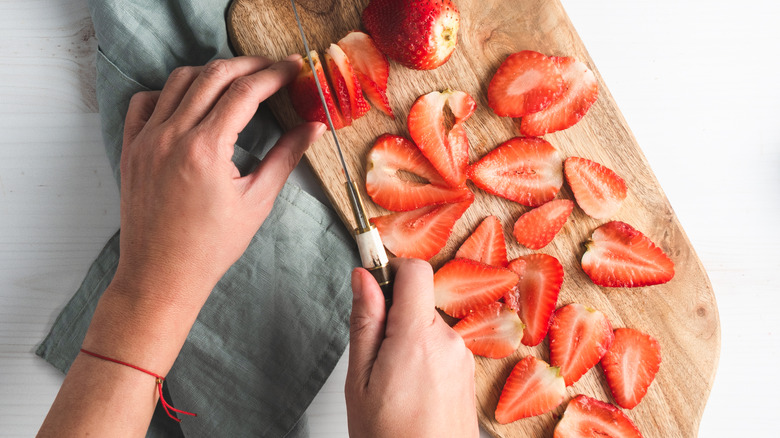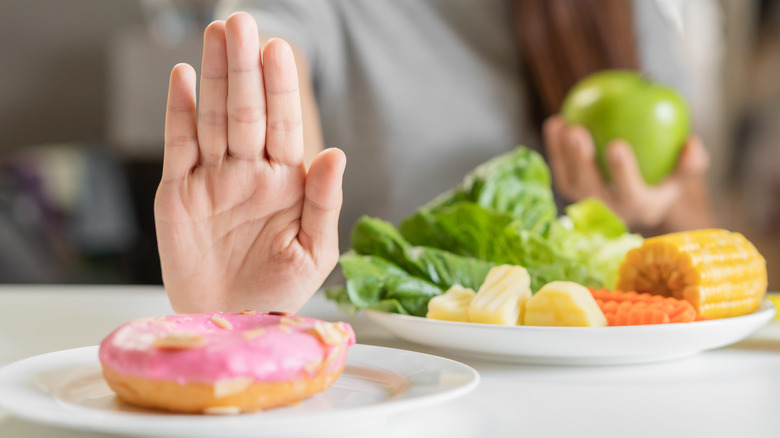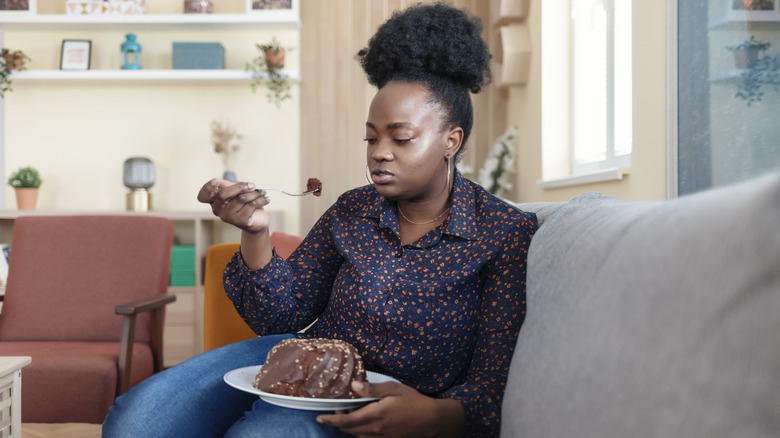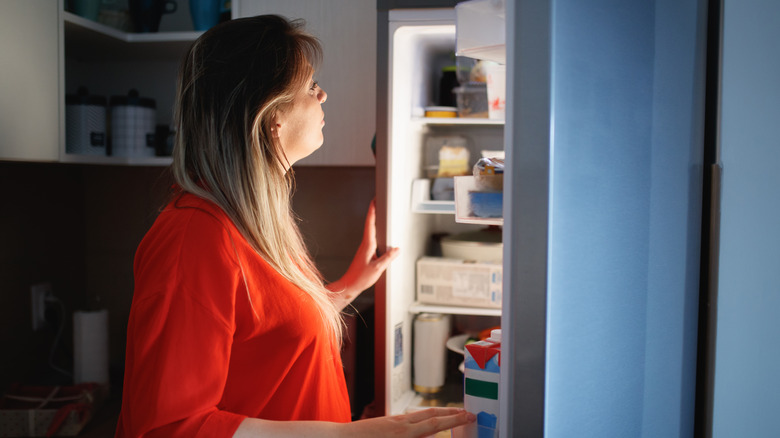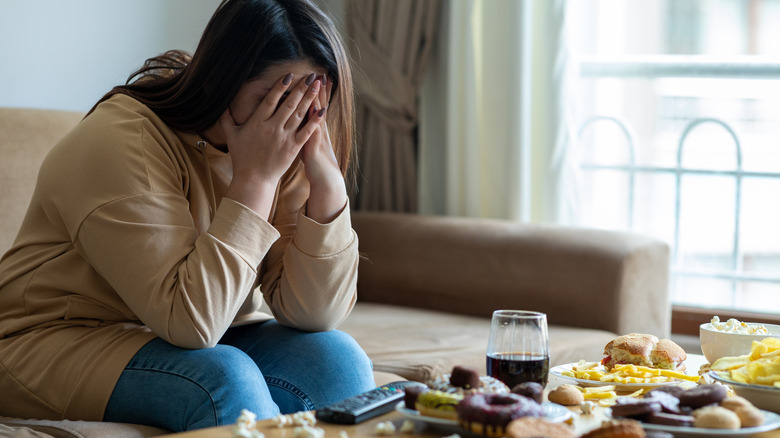9 Behaviors That Could Indicate Your Relationship With Food Might Need A Closer Look
Our relationship with food can be one of the hardest things to manage. Not only do we all need it to live, food is everywhere we turn. From television, to social media, to literally just walking down the street, it's nearly impossible to go anywhere and not be reminded of it. As Maryann Walsh, registered dietitian and certified personal trainer, told Forbes, "Your relationship with food is arguably one of the most important relationships in your life and should be made a priority."
It's little surprise, then, that the National Association of Anorexia Nervosa and Associated Disorders (ANAD) reported at least 9% of people across the world will experience eating disorders at some point in their life, including as many as 28.8 million people in the U.S. In such cases, food can sometimes become so detrimental to our mental health that there comes a time to get to the bottom of what's really going on. While eating disorders are illnesses based in the brain, many people also experience disordered eating, which describes unhealthy food behaviors such as skipping meals.
Everyone's relationship with food is different, of course, but having a healthy relationship essentially means — as non-diet dietitian and certified intuitive eating counselor Kirsten Ackerman told Forbes — "You're able to be flexible and don't feel guilt or shame around your food choice." But not everyone experiences this, and there are a few signs it may be time to look a little closer at your relationship with food.
If you need help with an eating disorder, or know someone who is, help is available. Visit the National Eating Disorders Association website or contact NEDA's Live Helpline at 1-800-931-2237. You can also receive 24/7 Crisis Support via text (send NEDA to 741-741).
Constantly thinking about food
Not being able to get food off your mind — and having days where it can be all you think about — may be a sign that there's something deeper going on with your relationship with food. Particularly if your non-stop thoughts about food have negative connotations, because you're worried about things like calories or nutrition, or you're feeling guilty about what you've already consumed or will soon consume. "If this is consuming your life and thoughts to the point of really bothering you, that's when it's time to seek help," Rachel Goldman, a clinical psychologist focused on health and wellness, told Self.
Equally, if you find you have a one-track mind when it comes to food — and you are allowing yourself to eat when your body tells you it's hungry — it may be time to find out exactly why you can't get food off your brain and see if there's a medical reason for what's going on. "Before eating, pause to ask yourself, 'Does my body need fuel? Why am I thinking about food if my body doesn't need it?'" Michelle May, doctor and author told ABC News. If you've just eaten and find you still can't stop thinking about eating, it may be time to seek out the advice of a medical professional.
Fear of eating in public
If you find it difficult to eat in front of people, or the idea of going out for a meal with a group fills you with dread, there could be a deeper issue when it comes to your relationship with food — especially if you've ever skipped an event because you knew you'd be encouraged to eat there or you've felt disengaged during an event in order to stay away from the food table. "If someone is trying to lose weight, has body image issues, or [has] any kind of disordered thoughts around eating and weight, they may be more hesitant to eat in front of other people," psychologist Rachel Goldman explained to Self.
One reason many people prefer to avoid public eating is that they feel a lot of shame about what they're consuming or have a fear of people criticizing them for their food choices. For some people, that could possibly be a sign of disordered eating. "Eating can be enormously anxiety-provoking for someone with an eating disorder," Cynthia Bulik, founding director of the University of North Carolina Center of Excellence for Eating Disorders shared with Health. "Doing it in public just compounds the enormity of the task."
Implementing food rituals
Another sign that it may be time to look a little closer at your connection with food is if you feel you have to go through a ritual before eating a meal. There are a number of different ways this can manifest, from having to cut your food up into small pieces to only being able to eat off a certain plate or having to eat each item in a certain order. "[This can be] both a tactic not to eat and also a piece of the obsessionality associated with anorexia nervosa," Dr. Cynthia Bulik explained to Health. "When eating disorders are starting, people will try to make it look like they are eating by cutting things up and shifting food around on the plate so as not to draw attention to how little they are eating."
Another sign you may need to look a little closer at your eating habits could be if a sudden change to this ritual sends up into panic mode. "Someone with disordered eating who is on a road trip with friends may be completely shaken by having to eat something that isn't part of the 'routine' or 'plan' — such as grabbing lunch from a fast-food drive-thru. In contrast, someone with a healthy relationship with food can roll with the punches and not be bothered by a change of routine," Brittany Wehrle, a sports dietitian and owner of Fueled & Well Nutrition, explained to HuffPost.
Avoiding certain food groups
If you find yourself avoiding certain types of food for long periods of time, such as carbs or sugars, rather than selecting foods from each group that you enjoy, that may be a sign your relationship with food isn't as healthy as it could be. Unless you have a medical reason and have been instructed by a professional to cut certain foods out of your life, having a healthy diet is all about balance, which means you need a little bit of everything to keep your body in tip-top shape.
One red flag that you may need to take a closer look at your eating habits is if you've started voluntarily cutting food out of your diet that you used to really enjoy. "When people are going down the path toward an eating disorder, one of the early symptoms is cutting out foods they used to like, or even entire food groups," Dr. Cynthia Bulik told Health.
If this is the case for you, ask yourself why you've not been allowing yourself the pleasure of eating that food. This is something a mental health professional or even a concerned loved one may be able to help you get to the bottom of. Discovering if your decisions stem from things like worrying about your weight or appearance, or if it's more related to issues surrounding control, will help you get the best treatment.
Binging and purging
Feeling like you're out of control around food and allowing yourself to eat as much as possible, followed by completely retreating and depriving yourself of food, isn't healthy — but it is natural. "Binging" on food is "a natural response to a physical restriction (actually not eating said food) or mental restriction (eating said food but not truly allowing yourself to have it)," Stef Jung, a holistic health coach and founder of Discover Food Freedom told Yahoo Lifestyle. "We often underestimate how powerful mental restriction is," they added.
Take a closer look at why you may not be fully allowing yourself to enjoy food, and if you feel there may be something deeper that's not letting you relate to food in a positive way, it may be time to do something about it. A cycle of binging and purging could potentially be linked to mental health issues like Binge Eating Disorder, which can cause serious health issues, so it's never a bad idea (and never too early) to seek help if you're struggling.
You're always hungry
Food is there to nourish us and stop us from feeling hungry, which is why it could be a bad sign if you feel like you're always spending your days fighting hunger and can't eat enough to stop it. "If you find yourself hungry all the time, then you may need to rethink your daily intake," Amanda A. Kostro Miller, registered dietician, told My Fitness Pal. "While sometimes hunger is due to boredom or habit, excessive hunger is your body's way to tell you that you need more calories, even if you're trying to lose weight."
That links to the idea that you can only ever have a certain amount of something, even if it's not fulfilling you. A sign that your approach to eating could be healthier is an intense focus on portion control even though you haven't been advised to by a medical professional, according to Alissa Rumsey, a dietitian, nutrition therapist, and author, who spoke to HuffPost. Though having sensible portions is actually a positive thing, eating so little it leaves you feeling hungry post-meal may be an indication that there could be an underlying issue.
Equally, constant hunger if you know you're giving your body the portion sizes and nutrition it needs could be a sign it's time to see a doctor, to see if there's a medical reason why you can't shake the hunger off.
Constantly linking food to exercise
Another troubling sign that you may need to examine your attitude toward eating could be the idea that all food has to be worked off, or that a "treat" food has to be compensated for in the gym. Of course, it's great to workout, and exercise is one of the very best things you can do to keep your body at its peak, but feeling the need to work the calories off every single time you eat something small — like a square of chocolate, for example — can be a sign that food is taking over your life. Particularly, as noted by The Dorm's registered dietitians and clinical therapists, if that need to work out is spurred on by feelings of guilt or shame over what you've put into your body.
Similarly, if you find yourself worrying or consumed with guilt if you miss your workout for the day, or don't like the idea of cutting a workout short because you know you've eaten something you wouldn't usually, "these are pretty good indices that things have gone too far," Dr. Cynthia Bulik told Health.
You want to punish yourself for eating unhealthy foods
Unhealthy foods shouldn't be eaten all the time, but you should be able to eat them without feeling the need to punish yourself afterward. As registered dietitian Joanna Foley told My Fitness Pal, it may be time to think carefully about your relationship with food if you can't go about your day without disciplining yourself for going over a calorie count or not being able to resist a treat.
Just as Rebecca Ditkoff, a dietitian and certified intuitive eating counselor, told HuffPost, there's no such a thing as good foods and bad foods as long as they're all eaten in moderation. "Food is not black and white and serves beyond just nourishment, and is also considered a form of self-care as well as a source of enjoyment," she shared. Dietitian Nina Mills added that, "This moralization of food often extends to the person doing the classifying so that they start to feel they are a good or bad, healthy or unhealthy human based on what they eat."
If you view yourself in a certain light because of what you ate that day, it may be time to take a close look at your relationship with food. Eating something you consider unhealthy doesn't make you bad or mean you didn't behave well that day. And you're not only a good person because you ate what you'd consider cleanly that day. You're so much more than what you're putting into your body.
You eat to deal with your feelings
Many of us use food to treat ourselves, whether it be a piece of cake after a long day of work or some chips following a particularly harrowing meeting at work. But you may need to analyze what's going on if you're finding yourself constantly using food (and particularly things that aren't healthy for you to eat regularly) to cope with your emotions.
Registered dietitian Liz Wyosnick explained to My Fitness Pal that using food as a stress reliever can lead to a boost in cortisol, which may mean your brain starts to associate fatty and sugar-filled foods with comfort. This is particularly dangerous because you'll likely never feel truly fulfilled through food, and it may potentially signify the start of a cycle of bad nutrition and weight gain. It's important to remember that emotional hunger and physical hunger are two different things, and treating the former by indulging in the latter won't fix any bigger issues.
What to do if you're worried about your relationship with food
One of the most important things you can do if you're starting to worry about your attitude toward eating is step back and take stock about why you're feeling the way you are. Is it related to appearance? Is it more to do with getting comfort in difficult times? Or is it something else entirely? Some people may find it easier to get to the root of any issues solo, but it's always worth seeking the help of a professional like a doctor, nutritionist, or therapist if you're worried.
Trained therapists are just that — they're trained to help you get to the bottom of your issues, which can take a lot of pressure off yourself to help you focus more on making your relationship with food healthier. "It's incredibly challenging to heal your relationship with food amid a culture that is, at baseline, very disordered with food," Kirsten Ackerman told Forbes.
In addition, you could find like-minded people by joining a local support group, learning more about healthy habits online, and trying, if you can, to be a little easier on yourself if you enjoy a treat every now and again. "Everybody overeats once in a while. The best you can do is continue to nourish yourself appropriately and just get back into your normal routine at the next meal or the next day," registered dietitian and certified personal trainer Maryann Walsh, suggested.



